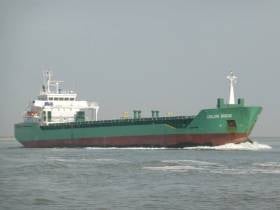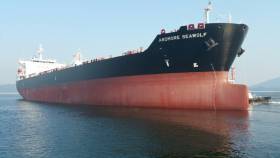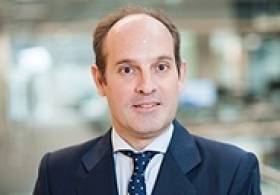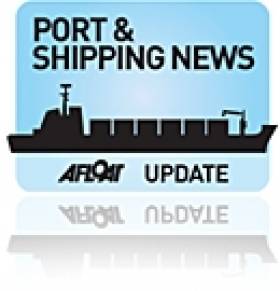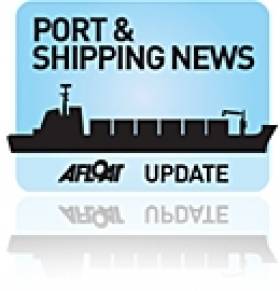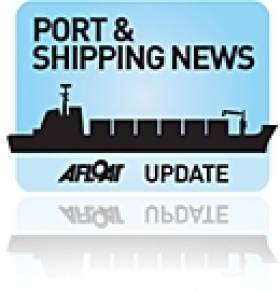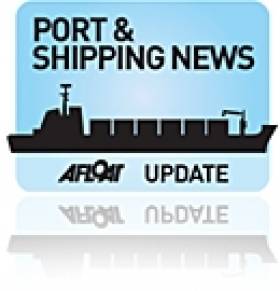Displaying items by tag: Ardmore Shipping
Ardmore Shipping Opts for Value Maritime’s Emissions-Cutting Technology on Initial Six Tankers
Chemical and products tanker company Ardmore Shipping Corporation has placed an order for Value Maritime’s emissions-reducing Filtree system, including the Clean Loop system, for an initial six medium-range (MR) tankers.
Aligning with Ardmore’s energy transition ambitions, the tankers will be made Carbon Capture ready for collecting CO2 emissions onboard in the future. Taking place during regularly scheduled drydocks, the Filtree units will be installed in yards in Europe and Asia. Timing installations in this way ensures zero disruption to the commercial activities of Ardmore’s vessels.
Cleaning the air & the seas
The Filtree system is based on innovative technology that will filter sulphur, CO2 and 99% of ultra-fine particulate matter from the tankers’ exhaust stream. The system uses a Clean Loop mechanism which additionally filters its own washing water, removing oil residues and particulate matter, ensuring the pH neutral value of the water and contributing to reduced acidification of seas and rivers.
Bridging the transition
Ardmore Shipping is looking for sustainable solutions for its fleet, now and for the future. Due to the Filtree system’s removal of sulphur from the exhaust gas flow, Ardmore can cut its emissions today while continuing to sail with more cost-effective high-sulphur fuel. Additionally, this positively affects the vessel's performance and maintenance requirements. As a direct result, the Filtree system offers a rapid return on investment.
A better future for shipping
Through its Energy Transition Plan (ETP), Ardmore has set the target of playing a pivotal role in the industry’s goal to reach net-zero emissions. To achieve this, Ardmore is finding technologies that promote the roll-out and short-term implementation of alternative fuels, as well as identifying and implementing fuel efficiency technologies that lead the way to a sustainable future for the tanker industry.
Garry Noonan, Director of Innovation - Ardmore Shipping “In terms of technology, we believe strongly in working with technical and commercial partners to develop solutions addressing the energy transition. As we embrace what could be referred to as the next generation in exhaust gas cleaning system technology, Value Maritime’s Filtree is unique in its ability to not only clean and neutralize overboard discharge, but also offer an additional benefit in the form of a potential carbon capture upgrade, this allows us flexibility today, while future-proofing our vessels for tomorrow in an economical and efficient way.”
The next generation of efficiency technologies
Value Maritime has designed the Filtree as a plug and play system. The Filtree system to be installed on the Ardmore tankers will be outfitted with a modular CO2 capture and storage system to help reduce further emissions when this becomes viable. With this, CO2 is captured from a vessel's exhaust and stored in tanks onboard. This is then discharged onshore where it can be used, for example, in the sustainable cultivation of greenhouse crops, methanol plants, and even the food industry.
Yvette van der Sommen, Director Asia Pacific - Value Maritime: “We are already enjoying our collaboration with the team at Ardmore Shipping. Like us, they are always thinking of new ways to stay ahead and achieve substantial emissions savings to unlock further potential for greener operations. Integrating our technology into their suite of sustainable solutions means their fleet can make an impact from day one of sailing with the Filtree.”
Value Maritime
Value Maritime’s vision is to dramatically decrease the environmental footprint of shipping and significantly contribute to improving the overall sustainability of the maritime industry. Since 2017, their technology has been helping shipowners and operators to increase their competitiveness by achieving valuable emission reductions and financial savings.
Value Maritime is a fast-growing and innovative company that is sustainable by nature with a team that is dedicated to making an impact.
Ardmore Shipping Corporation
Ardmore owns and operates a fleet of MR product and chemical tankers ranging from 25,000 to 50,000 deadweight tonnes. Ardmore provides, through its modern, fuel-efficient fleet of mid-size tankers, seaborne transportation of petroleum products and chemicals worldwide to oil majors, national oil companies, oil and chemical traders, and chemical companies.
Ardmore's core strategy is to continue to develop a modern, high-quality fleet of product and chemical tankers, build key long-term commercial relationships and maintain its cost advantage in assets, operations and overhead, while creating synergies and economies of scale as the company grows. Ardmore provides its services to customers through voyage charters, commercial pools, and time charters, and enjoys close working relationships with key commercial and technical management partners.
Ardmore's Energy Transition Plan (ETP) focusses on three key areas: transition technologies, transition projects, and sustainable (non-fossil fuel) cargos. The ETP is an extension of Ardmore's strategy, building on its core strengths of tanker chartering, shipping operations, technical and operational fuel efficiency improvements, technical management, construction supervision, project management, investment analysis, and ship finance.
Ardmore has established Ardmore Ventures as Ardmore's holding company for existing and future potential investments related to the ETP and completed its first projects under the plan in June 2021.
Port of Cork Hosts International Standard for Maritime Pilots Organisations (ISPO) Annual Conference
The Port of Cork is playing host for the International Standard for Maritime Pilot Organisations (ISPO) annual Conference which began today.
The two-day Conference held in the Dean Hotel, near Horgan's Quay, is also in partnership with the International Association of Marine & Shipping Professionals (IAMSP).
The conference program offers associates and interested pilot organizations a varied number of speakers who will discuss ISPO related topics. Among them Afloat adds the award winning global chemical and product tanker operator Ardmore Shipping which has an operations office based in Cork city.
As part of the conference, a workshop was scheduled this morning by Bureau Veritas on how to conduct an internal audit according to the ISPO Code and topics such as Designated Person, Observations and NC's discussed.
Tomorrow, the ISPO's annual meeting of associates will be held in the afternoon.
Ardmore Shipping's 'Safety Rating App' Wins at Maritime & Port Authority Singapore International Safety@Sea Awards 2022
Chemical and product tanker operator, Ardmore Shipping which developed a ‘Safety Rating’ app for their crew, was announced as a winner at the 2022 Maritime and Port Authority Singapore (MPA) International Safety@Sea Awards.
The app launched in late 2020 by the company which has it principal operating office in Cork, had went through a process of implementation, crew familiarization, and participation throughout 2021. The app allows crew members to build and maintain a ranking of their safety competency, which can be transferred as they transfer between vessels across the Ardmore fleet. Afloat adds the fleet comprises of 16 tankers, each just shy of 50,000dwt and an average age of just six years and the majority of the fleet are dual chemical/product tankers.
Crew members onboard the fleet use the app program to anonymously assign safety ratings to their crew mates – on a scale of 1 to 5 – against a list of soft skills and behavioral competencies, as well as areas of safety awareness. This includes elements such as safety initiatives, leadership, Personal Protective Equipment usage, teamwork capabilities, assistance of fellow team members, and level of participation in safety meetings/drills.
The core objective of this initiative is, over a period of time, to have every seafarer on the Ardmore team develop an individual rating. These ratings will ‘follow’ each seafarer throughout their employment as an Ardmore crew member, incentivizing individuals to maintain a high safety standard throughout their careers and enable Ardmore to respond to gaps with further training and support both onboard and on shore.
The Safety@Sea award was accepted by Ardmore’s Singapore General Manager and Head of Commercial, Gerald Tan on behalf of the apps creator Abhijit Ghosh, Ardmore’s Marine Manager.
Abhijit said: “It’s fantastic to have the success of this initiative recognized by the MPA. We look forward to further developing and implementing the system, with the overall aim of achieving zero accidents and injuries onboard our vessels. The human element is of utmost importance to Ardmore, and we hope that programs like these will further increase safety awareness among our crew.”
Ardmore commenced operations in 2010 and the operator has since grown in the ownership and operation of product and chemical tankers in worldwide trading. In addition to Cork, they have offices located in the USA, Bermuda, Singapore and Hong Kong.
Shipping Snippets: Ardmore Tanker Calls to Bantry, Arklow Disposes Cargoship & Mainport Chase Vessel Departs Cork Dockyard
#ShippingSnippets - A 183m tanker from Ardmore Shipping Corporation based in Bermuda which also has a principle operating office located in Cork, made a call to Bantry Bay recently, writes Jehan Ashmore.
Ardmore Seaventure which at 49,999 dwt is on of the largest of the 27 strong fleet had anchored at the single point mooring (SPM) system at the Whiddy Island oil terminal. The ship had sailed from Ventspils, Latvia and has since headed to west Scotland. Until yesterday, the tanker had taken anchorage in Brodrick Bay, Isle of Arran (see 'Superyacht' posting).
Bantry Bay Terminals is operated by Zenith Energy, where the facility is also capable of handling VLCC’s and 30-meter draft vessels for the discharging of petroleum cargoes and other products.
Another short-sea trader from Arklow Shipping Nederland B.V., Arklow Bridge is no longer part of the Dutch division fleet. The 4,723gt vessel only built in 2011, is one of a pair of original 'B' class ships. The other sister Arklow Brook remains in service. They differ to a succession of ships from a varient of the 'B' series also built by Bodewes in the Netherlands.
Afloat has tracked down the 116m cargoship which has been renamed Aasvik, when berthed in Szczecin,Poland. Also a change of flag to Gibraltar has taken place.
An earlier 'Brook' had served ASL, having been custom built at Appledore Shipbuilders in 1990 followed by sister 'Bridge' the next year. The yard in Bidna, north Devon is now Babcock Marine & Technology's facility that is currently constructing the Naval Service's fourth OPV90 sister to be named L.E. George Bernard Shaw.
Cork based Mainport Group's seismic chase vessel, Mainport Kells has been at the Cork Dockyard facility. The 350grt vessel of only 37m built almost a decade ago at the Shin Yang yard Malaysia in 2008, had yesterday carried out sea trials beyond the harbour off Roches Point Lighthouse.
Corkonians would of seen Mainport Kells berthed previously at Cork city quays. A fleetmate the seismic survey vessel Mineport Pine remains there along North Custom Quay.
Ardmore Shipping Selects UK P&I Club
#Ardmore - Ardmore Shipping operators of chemical and product tankers (25,000 to 50,000dwt) has selected the UK P&I Club as its second P&I club.
On the back of the steady growth in the size of the Ardmore fleet which now stands at 27 ships, Ardmore decided to select a second club to provide Protection and Indemnity cover.
Commenting on the decision, Georgina Alderman, Ardmore’s Marine and Insurance Manager, said: “We looked at a number of options, including other UK based clubs, but we felt that the UK Club represented the best fit with our requirements, as well as with our ethos as an owner and operator committed to the highest standards of commercial and operational practices.
She added "We are looking forward to working together with the UK Club as an important partner for Ardmore Shipping.”
The UK Club will provide cover for three ships in Ardmore’s fleet.
As previously reported on Afloat, Jorge Lavin was recently appointed as the company's Financial Controller.
Tanker Operator Ardmore Appoints New Financial Controller
#Appointment - Ardmore Shipping Corporation which relocated its Principal Operating Office from Mahon outside Cork to the city centre in recent months, has appointed Jorge Lavin as the company's Financial Controller.
In his new position, Jorge is closely involved in helping Ardmore (operators of chemical and product tankers) to meet its financial reporting requirements. In addition to preparing internal reporting for Ardmore’s senior management team and Board of Directors, and managing the Ardmore’s cash management system.
Jorge trained as a Chartered Accountant with EY where he worked with multinational clients including Telefonica and Teekay. Following EY, he joined the Ferrovial Group, one of biggest construction companies in the world.
While at Ferrovial, he held roles in Group Financial Control and as Head of Financial Compliance and Group Financial Controller of Heathrow Airports Holdings (formerly BAA). He was most recently the Group Financial Controller of Ferrovial US. Jorge is also qualified in Financial Risk Management and is a Certified Public Accountant.
Another Ardmore Newbuild This Time Tanker ‘Seafox’
#NewbuildTanker- Ardmore Shipping Corporation this week have announced that its latest newbuild Ardmore Seafox, was delivered by SPP Shipbuilding Co Ltd.
The Sacheon shipyard in South Korea handed over the 49,999dwt product and chemical newbuild on 25th June 2015.
Ardmore Seafox increases the number of Ardmore vessels on the water to twenty with a total tonnage of 819,519 DWT.
She follows Ardmore Sealion which was also delivered bySPP Shipbuilding Co., Ltd but at their Goseong shipyard in Korea.
Technical management of the Ardmore Seafox will be provided by Univan Ship Management Ltd.
Commenting on her delivery, Mark Cameron, Ardmore Shipping's COO, said: "We are pleased to take delivery of this sister ship to the Ardmore Sealion and we extend our thanks to SPP Shipbuilding for their hard work and dedication throughout the build process. The addition of the Ardmore Seafox realises our continued commitment to incorporating high quality, modern and efficient vessels to our fleet.
As with the Ardmore Sealion, the Ardmore Seafox is a high quality eco-design Ardmore vessel, fully equipped with a variety of fuel-saving measures including Skysails technology and offering the highest standards of performance for our customers. With an average age of under four and a half years, the Ardmore fleet is among the youngest in the industry.
This is the second of four newbuild vessels to be delivered from SPP Shipbuilding this year and we look forward to continuing to work closely with SPP Shipbuilding on the remaining two vessels in the series due for delivery in the second half of this year. We wish the Ardmore Seafox and her crew safe seas and fair winds as she goes on to fulfill her long and successful service within the Ardmore fleet."
Another Ardmore Tanker As 'Sealion' Joins the Fleet
#ArdmoreNewbuild - Ardmore Sealion a 49,999dwt newbuild has been delivered to Ardmore Shipping from SPP Shipbuilding Co., Ltd at the Goseong shipyard in South Korea.
The launch of Ardmore Sealion classified as an IMO 3 product and chemical tanker took place on 26 May. She joins the Ardmore fleet, which now has nineteen vessels (see previous report on Afloat.ie). Technical management of the Ardmore Sealion will be provided by Univan Ship Management Ltd.
Commenting on her delivery, Mark Cameron, Ardmore Shipping's COO, said: "I would like to extend our sincere thanks to the Ardmore site team who have worked closely with the SPP Shipbuilding team in bringing the newbuilding process together to deliver a high quality vessel. We extend our thanks to SPP Shipbuilding for all of their hard work and commitment through the build process.
The Ardmore Sealion is another high quality eco-design Ardmore vessel and she is fully equipped with an array of fuel-saving measures, along with Skysails technology, to ensure the highest standards of performance for our customers.
This is our first newbuild vessel to be delivered from SPP Shipbuilding this year and we look forward to continuing our close working relationship with SPP Shipbuilding on the remaining three vessels in the series due for delivery throughout the year."
#ArdmoreNewTanker - Ardmore Cheyenne has been delivered from Fukuoka Shipyard in Nagasaki, Japan to Ardmore Shipping which has its financial headquarters in Mahon, Cork, writes Jehan Ashmore.
The 25,000 dwt newbuild which is classified as an IMO 2 product and chemical tanker will have its technical management provided by Thome Ship Management.
She is to join sister Ardmore Cherokee, into the increasingly expanding Ardmore fleet, which currently stands at eighteen vessels. The fleet total equates to a tonnage of 718,000dwt and with an average vessel age of five years.
Commenting on her delivery, Mark Cameron, Ardmore Shipping's CEO, said:"We're delighted to see the Ardmore Cheyenne join our fleet and we extend our sincere appreciation to everyone at Fukuoka Shipyard for their hard work, dedication and professionalism, along with all those involved in ensuring her successful delivery".
"She is our second newbuild vessel from Fukuoka this year, with the third and fourth in the series due to deliver in the coming months. Like the Ardmore Cherokee, the Ardmore Cheyenne has been designed and built to the very highest standards and equipped with an array of fuel-saving measures to ensure the highest standards of performance for our customers. We look forward to her successful service in Ardmore's fleet and we wish her crew safe seas and Godspeed."
In February, the tanker products company also took delivery of Ardmore Dauntless and Ardmore Defender from another yard in Asia, that time from the Hyundai Mipo Dockyard ("HMD") in South Korea. Each of these newbuilds are 37,000 dwt and likewise of 'Cheyenne' are IMO 2 product and chemical tankers.
As previously alluded both South Korean built newbuilds were delivered in February with the Ardmore Dauntless delivered first and followed by Ardmore Defender on the 27th of that month.
The eco-design quality and industry-leading levels of fuel efficiency and environmental performance sees the pair employed in the Navig8's Delta8 pool.
Ardmore Dauntless and the Ardmore Defender are each equipped with the SkySails' Performance Monitor voyage optimization system.
The system provides real-time data monitoring and analysis to enable the team on the bridge and onshore to constantly optimize the operational performance of the vessel.
New 25,000dwt Tanker Joins Ardmore Shipping Fleet
#NewbuildTanker- Ardmore Cherokee, a 25,000dwt products and chemical tanker became the newest addition to Ardmore Shipping Corporation, following delivery from a Japanese shipyard.
The IMO II classed tanker was completed by Fukoaka Shipbuilding and she is the fifteenth vessel to join Ardmore’s fleet in service under the technical management of Thome Ship Management.
Like her fleetmates, Ardmore Cherokee, has been fitted with an array of fuel efficiency technologies, including the SkySails’ performance monitoring system, in order to deliver optimal operational performance.
Mark Cameron, COO of Ardmore Shipping, commented: “We’re delighted to have taken delivery of the Ardmore Cherokee. She has been designed and built to the very highest standards and we would like to thank all those involved in her successful delivery by Fukuoka Shipbuilding for their hard work and commitment. We wish her master and crew safe seas and look forward to her contribution to Ardmore’s continued growth.”
The corporation whose principle operating office based in Mahon Co. Cork as previously reported on Afloat.ie had reported a net profit of $117,000 for the three months ended September 30, 2014.


























